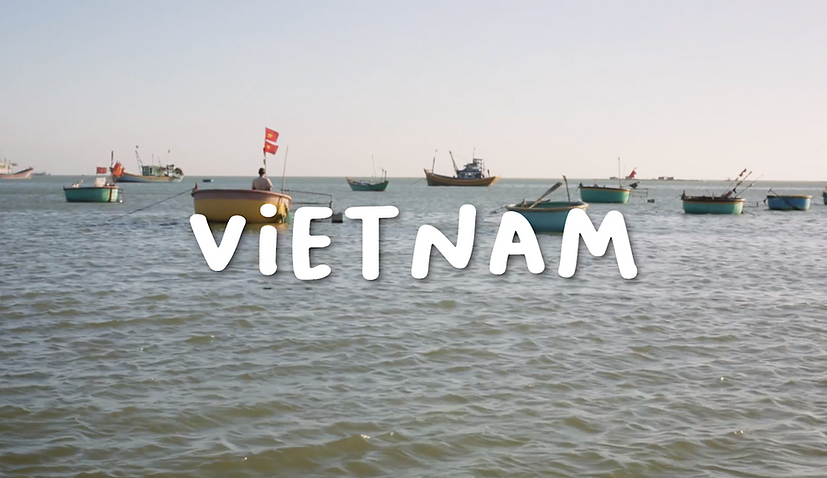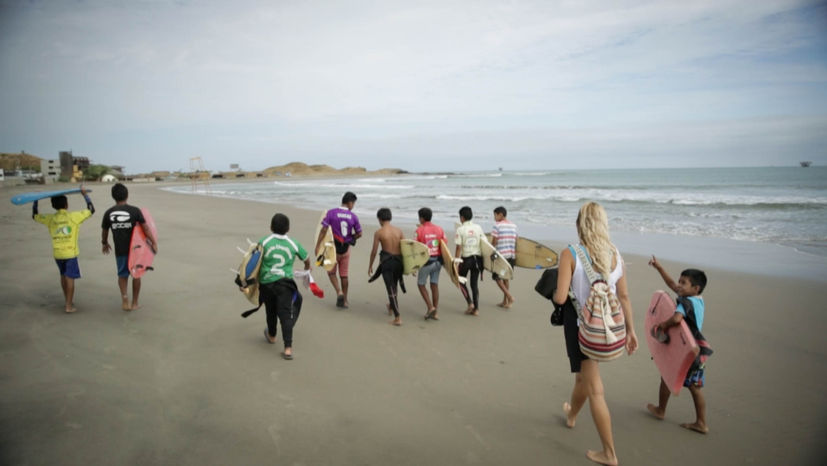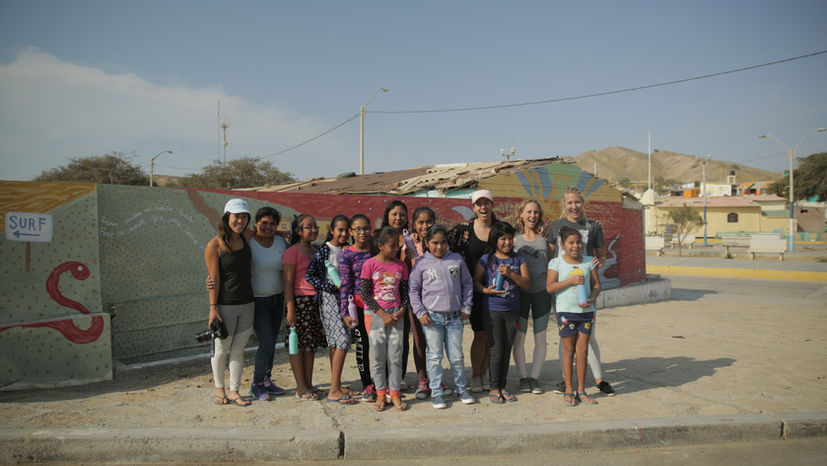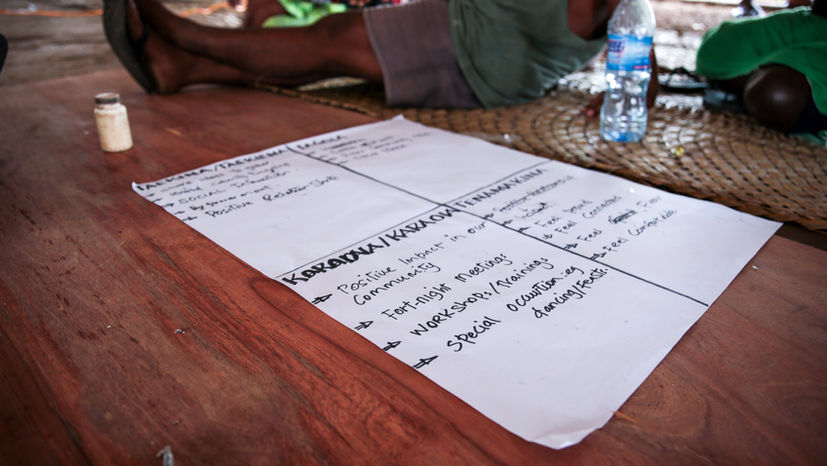
Nuestros programas se centran en cultivar relaciones con socios locales y facilitar talleres codiseñados de uno a seis meses de duración. Colaboramos internacionalmente con organizaciones sin fines de lucro y de impacto social para producir y facilitar programas prácticos centrados en el desarrollo positivo de jóvenes en comunidades pesqueras artesanales. Adoptando principios de estrategia emergente, fomentamos la adaptabilidad, la resiliencia y la interconexión en nuestras iniciativas. A través de pedagogías de un mundo común, enfatizamos el aprendizaje colectivo y la relacionalidad, fortaleciendo la curiosidad y la creatividad de los jóvenes.
Nuestro enfoque resalta cómo la geografía moldea a los jóvenes y cómo los jóvenes, a su vez, moldean la geografía, usando sus voces para crear futuros positivos para sus comunidades pesqueras rurales.
Desde cortometrajes hasta arte callejero, animación stop-motion, diseño web y fotografía, los participantes en nuestros programas de uno a seis meses aprenden mediante actividades situacionales que se centran en el lenguaje, las habilidades y los conocimientos necesarios para convertirse en autores resilientes de sus historias de vida. Preparamos a los jóvenes para acceder a nuevas oportunidades que contribuyen a su crecimiento personal, su patrimonio cultural y la biodiversidad de la región.

PERÚ
Base de operaciones
Lobitos, Perú
Octubre de 2014 - Actualidad
El programa anual de Coast 2 Coast en Lobitos, Perú, comenzó como una colaboración con WAVES Lobitos a través del Proyecto de Cine Lobitos y Beyond the Surface International. Inicialmente enfocado en facilitar talleres gratuitos de fotografía para la comunidad local, este programa se ha convertido en la base de diversas iniciativas. Estas incluyen Mujeres y Agua, Festival Somos Mar, Comida del Mar, Mapa de Coast 2 Coast, el Currículo de las Directrices SSF y muchas más. Con los años, Lobitos se ha convertido en un centro dinámico para nuestros esfuerzos colaborativos, que buscan involucrar a esta comunidad pesquera artesanal a través de las artes creativas, el surf, la educación basada en el lugar y prácticas sostenibles donde los niños crecen con una afinidad por su comunidad, tanto construida como natural. Hemos cultivado relaciones con los espacios, personajes y acciones que hacen de Lobitos un lugar único y el lugar que llamamos hogar.
Desde Lobitos, nos hemos asociado con otras comunidades pesqueras dinámicas costeras y continentales y con increíbles socios locales en todo el país para facilitar talleres que se centran en construir relaciones afectivas con nosotros mismos y con el mundo que nos rodea.
Talleres Somos Rios | We are Rivers Inland Workshop Series


Solomon Islands
Revitalización cultural en Gizo, Islas Salomón
Julio - agosto de 2024
En Gizo, ubicada en la Provincia Occidental de las Islas Salomón, Coast 2 Coast se asoció con Positive Change for Marine Life y Kastom Keepers para implementar un programa centrado en revitalizar los conocimientos tradicionales para lograr entornos saludables. Con el apoyo de una subvención de USAID, esta iniciativa buscó reconectar a las comunidades pesqueras locales con sus prácticas ancestrales para promover relaciones ambientales sostenibles.
Positive Change for Marine Life es una organización australiana sin fines de lucro dedicada a proteger los ecosistemas marinos y empoderar a las comunidades mediante la educación, el desarrollo de capacidades y las iniciativas de conservación. Kastom Keepers, un proyecto de Millicent Barty, becaria de Emerson Collective y becaria Obama, trabaja para preservar y revitalizar los conocimientos tradicionales y las prácticas culturales en las Islas Salomón. Juntas, estas organizaciones colaboraron con Coast 2 Coast para implementar un programa que integró los conocimientos ecológicos tradicionales con métodos modernos de conservación.
El programa involucró a las comunidades pesqueras locales de Gizo, centrándose en la transmisión de conocimientos tradicionales relacionados con las prácticas pesqueras sostenibles, la salud ambiental y la importancia cultural del entorno marino en relación con el bienestar. Mediante talleres y reuniones comunitarias, los ancianos compartieron su conocimiento de la tierra y el mar mediante mapas de empatía, caminatas de memoria y conversaciones con las generaciones más jóvenes. Mediante sesiones de planificación de acciones comunitarias, los participantes establecieron objetivos para continuar revitalizando y practicando el patrimonio cultural para un futuro resiliente.

VIETNAM
Fulbright-National Geographic Storytelling Grant in Mui Ne, Vietnam
October 2019 - April 2020
Gracias a una beca de investigación Fulbright en colaboración con la Embajada de Estados Unidos en Hanói y una subvención de National Geographic, Coast 2 Coast facilitó talleres de FotoVoz con familias de pescadores locales a lo largo de la costa y las islas del sur de Vietnam. Colaboramos con dos organizaciones vietnamitas locales sin fines de lucro: MANTA y el Centro para la Conservación de la Biodiversidad y las Especies en Peligro de Extinción (CBES).
MANTA es la primera y única escuela oficial de vela de Vietnam, que promueve la salud humana y ambiental a través de los deportes acuáticos. MANTA ayuda a los pescadores a abandonar hábitats en peligro y la sobrepesca, aplicando sus instintos oceánicos a la formación en deportes acuáticos y a desarrollar habilidades de supervivencia frente al cambio climático. Este programa de medios de vida alternativos cuenta con el apoyo de grandes grupos de escolares y socios corporativos.
El Centro para la Conservación de la Biodiversidad y las Especies en Peligro de Extinción (CBES) es una organización sin fines de lucro dedicada a la conservación de la biodiversidad y la protección de las especies en peligro de extinción mediante la investigación, la educación y la participación comunitaria. El CBES aborda las lagunas de conocimiento y promueve prácticas sostenibles, especialmente ante los rápidos cambios ambientales y el desarrollo.
Estos talleres se centraron en los impactos sociales y ecológicos de la baja disponibilidad de pescado en el bienestar de las aldeas vietnamitas de pescadores artesanales. Los datos recopilados contribuyeron al desarrollo de una herramienta de monitoreo participativo para la implementación de las Directrices Voluntarias para Asegurar la Sostenibilidad de la Pesca en Pequeña Escala en el Contexto de la Seguridad Alimentaria y la Erradicación de la Pobreza (Directrices PPE) de la Organización de las Naciones Unidas para la Alimentación y la Agricultura (FAO). Las Directrices PPE son el primer instrumento internacional dedicado íntegramente al vital sector de la pesca en pequeña escala, fruto de un largo e intensivo proceso consultivo global de abajo a arriba.


INDONESIA
Action Communication Program in Morotai, North Maluku, Indonesia
October 2018 - April 2019
Gracias a la subvención del Consulado de EE. UU. en Surabaya, Coast 2 Coast se asoció con un socio local, A Liquid Future, para lanzar el programa "Comunicación de Acción" en Morotai, Molucas del Norte, Indonesia. Morotai fue seleccionada por el gobierno indonesio como isla para desarrollar actividades turísticas. Durante seis meses, colaboramos con escuelas de tres comunidades pesqueras remotas para prepararnos para esta ola de desarrollo.
Nuestro currículo audiovisual enfatizó el inglés orientado al activismo, donde los estudiantes coprodujeron entrevistas, proyectos de FotoVoz y narrativas cortas. En lugar de aprender frases como "El gato está en la mesa", los estudiantes aprendieron a decir: "Este es mi cocotero. No puedes cortarlo". Estas actividades permitieron a estudiantes y educadores locales expresar sus deseos y lo que aprecian de su hermosa isla, fomentando el orgullo y la defensa de su entorno socioecológico. A través de este programa, los estudiantes desarrollaron sus habilidades en inglés y aprendieron a usar los medios digitales para contar sus historias y defender a sus comunidades en medio de la creciente ola de turismo en las islas aisladas de Indonesia.

COLOMBIA
Surf y cultura en San Bernardo del Viento, Colombia
November - December 2015
En San Bernardo del Viento, una comunidad costera de Colombia, Coast 2 Coast implementó su primer programa. Reunimos algunos ahorros y cocreamos un programa que combinaba surf, educación ambiental y artes creativas para involucrar a la juventud local. Junto con nuestro increíble socio local, la Fundación Sinumar, el programa buscaba fomentar una conexión profunda entre los participantes y su entorno costero, tanto natural como construido.
Fundación Sinumar es una organización local sin fines de lucro dedicada a la conservación de los ecosistemas marinos y a la promoción de prácticas sostenibles en las comunidades costeras. El proyecto, liderado por nuestra querida amiga Dorcas, líder comunitaria, cantautora y activista social afroindígena, ofrece dos programas clave: Empoderamiento y Alfabetización Femenina y Conciencia Ambiental. Estos programas se centran en el desarrollo de la alfabetización y la conciencia ambiental de los participantes mediante el aprendizaje experiencial. Cada programa ayuda a los participantes a comprender su identidad ancestral y cultural, fomentando una sólida participación comunitaria y su protección. A través de estas iniciativas, los participantes aprenden a conservar su tierra y su vida silvestre, a la vez que promueven la paz en su comunidad.
A lo largo del programa, los estudiantes participaron en actividades que combinaron deportes acuáticos con lecciones sobre gestión ambiental y responsabilidad social. El surf sirvió como puerta de entrada para inculcar en los jóvenes participantes un sentido de orgullo y autonomía, animándolos a participar activamente en la preservación de su entorno y patrimonio cultural. Mediante proyectos de artes creativas, los estudiantes compartieron sus experiencias y aprendieron a defender el bienestar de su comunidad.































